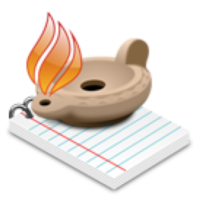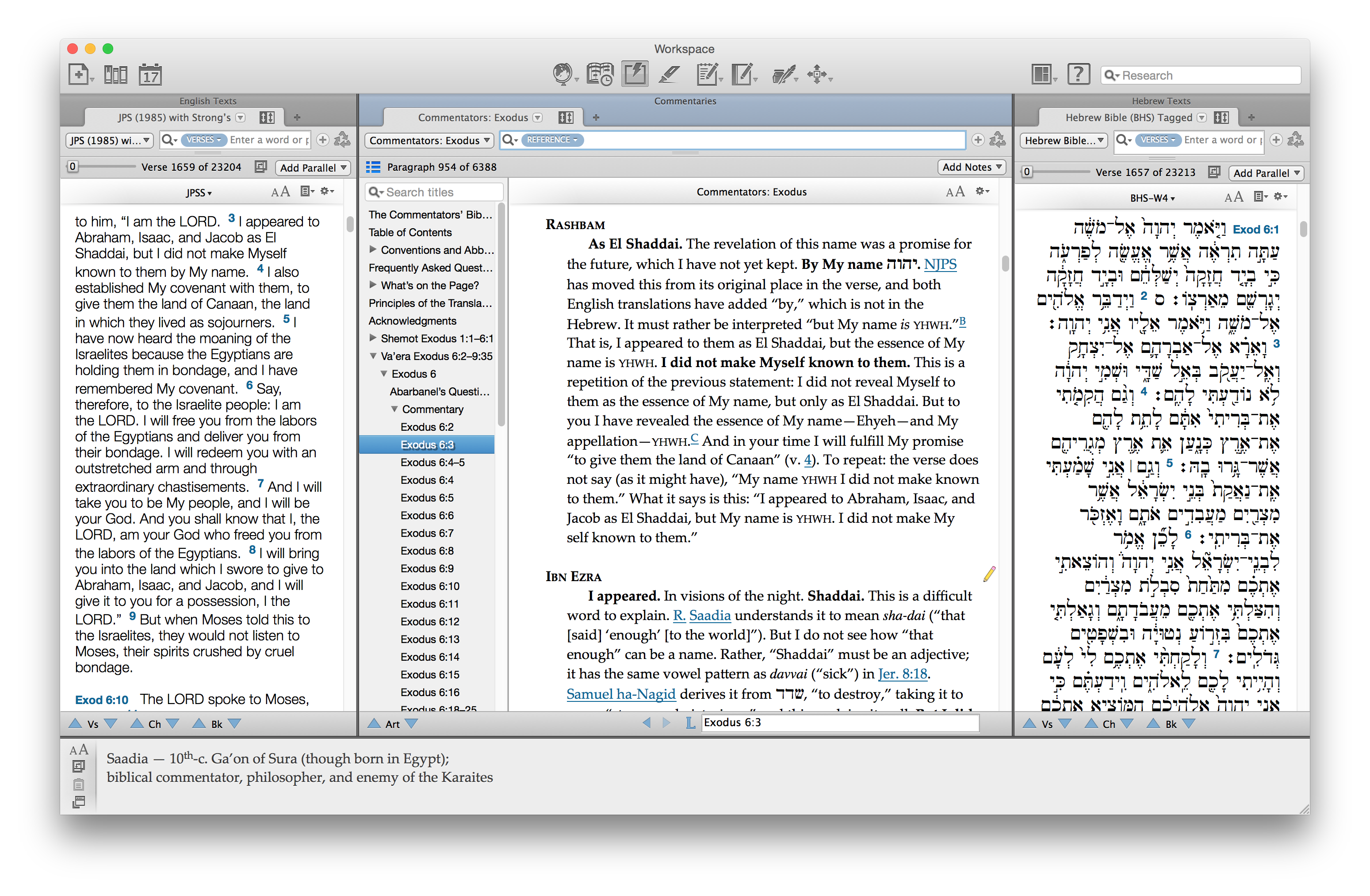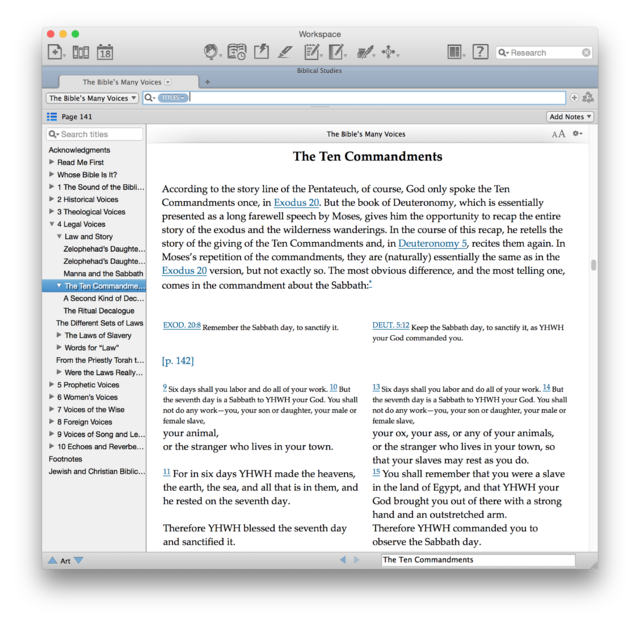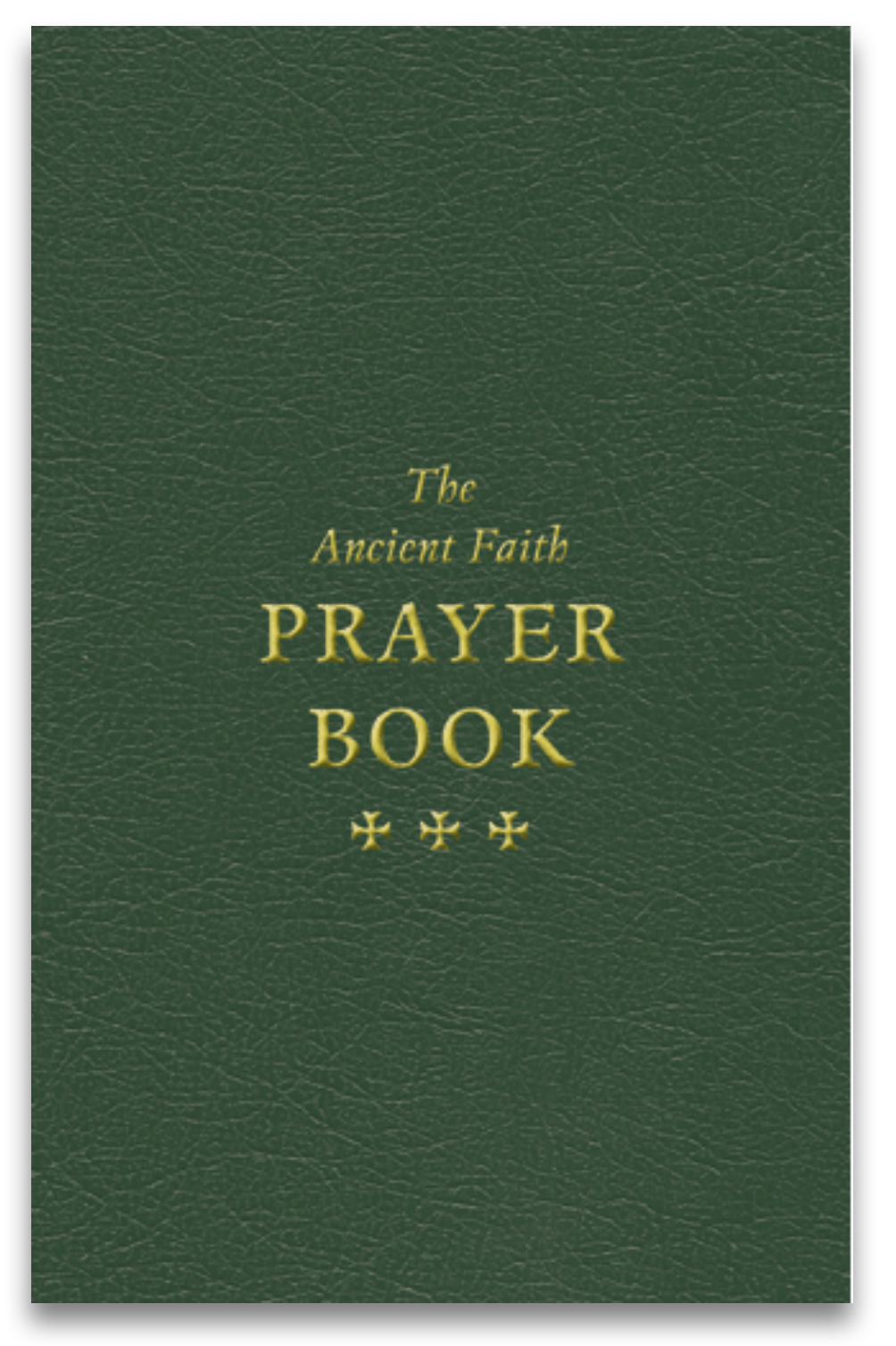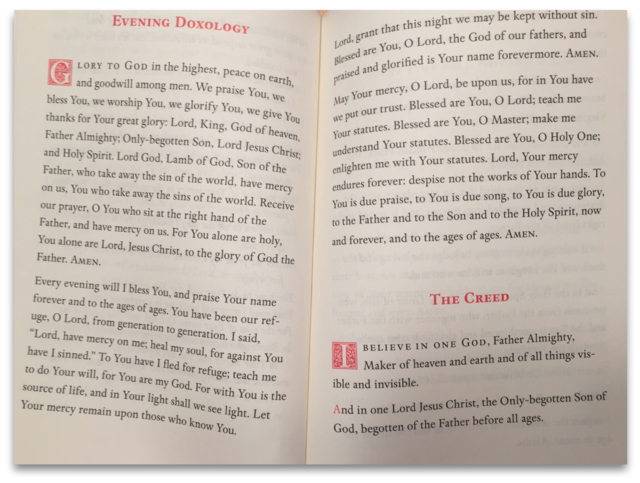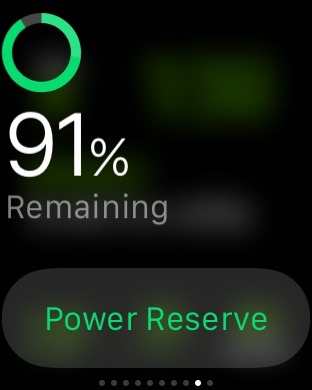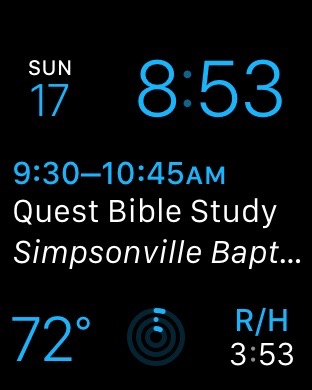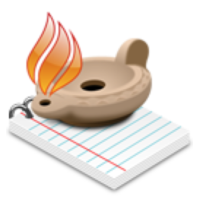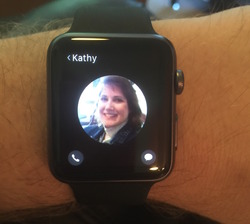I'm writing this (or at least the beginning of it) on Tuesday, May 26, from the Sleep Inn outside of the Atlanta Airport, where Kathy and I are spending the night because our connecting flight between New Orleans and Louisville was cancelled due to inclement weather.
We made a quick trip to New Orleans over Memorial Day Weekend to claim a two-night stay at the Bourbon Orleans Hotel in the French Quarter, which was part of the Grand Prize for my winning the
Louisiana Peach Festival Cookery Contest last summer. It was a nice quick getaway until our flight home was cancelled at the halfway point. But this unanticipated waypoint along the way gives me a chance to write about an aspect of this trip that was different from others made in the past: the addition of the Apple Watch.
Here is our visit to the Crescent City as seen through the use of four Apple Watch apps.
Fly Delta
I had not flown Delta any time in recent memory, and in fact, I didn't even have the Fly Delta app on my iPhone. Knowing that the Apple Watch can be used as a boarding pass, I definitely wanted to try this out, but didn't actually begin setting it up until Sunday morning when we were waiting at the airport.
I installed the Fly Delta app to my iPhone a couple of days earlier, and the corresponding Apple Watch app was immediately added to my watch. The app on my phone sent me a notification reminder the day before and even suggested I go ahead and check in. I opted not to do this because Kathy and I didn't have seats together, and I wanted to see someone at the ticket counter to make certain we were sitting next to each other on all legs of our journey.
After getting our seats squared away, I opened the Fly Delta app on my Apple Watch to see if I could see my boarding pass QR code. No such luck--it wasn't there. In fact, the Fly Delta app on the watch is pretty limited. It will show you your flight number, gate and offer a countdown until boarding time; but that's about it. Then, I remembered from using similar apps in the past from other airlines, that the boarding pass is both accessible in the iPhone app and can be added to the Apple Passbook. So, I added it to my Passbook from the Fly Delta app on my iPhone, and voila! It was now on my Apple Watch. In fact, a Fly Delta notification appeared on my Apple Watch, allowing a shortcut to the Passbook for quick access.
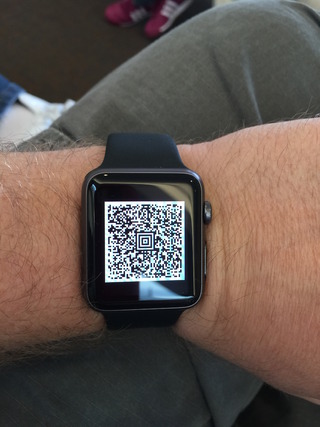 My Delta boarding pass.
My Delta boarding pass.Most use of the Apple Watch is only for a few seconds. And if you lower your arm, or move it into a position not optimal for personal viewing, whatever is on the screen usually disappears. However, once I opened the QR code for my boarding pass from the Passbook, my watch stayed on, even if I changed the position of my arm. I didn't time it to know how long it stays on, and discovered it will eventually go off, but it stayed on long enough that I could set it when there were still a half dozen or so passengers ahead of me, and it stayed on long enough for me to stick my arm under Delta's scanner when it was my turn.
From what I could tell, Delta's scanners had no more trouble reading my watch than they would a boarding pass on the phone. Is there any really advantage? Maybe. At the very least, my phone could stay in my pocket, but I still had to have my hand free regardless.
As is the norm right now (I can't imagine it will be for very long), the Apple Watch does create attention. The Delta employee at the Louisville gate told me that my Apple Watch was her "first." And a security agent, after seeing my unsuccessful try to scan my watch in Chattanooga (more about this in a second) when reboarding our diverted plane, told me he was going to have to confiscate my Apple Watch. He was just kidding but was very interested in hearing details from me as to my experience using it.
About that re-board in Chattanooga: I guess paper boarding passes will remain a good backup. On our way home, our flight got rerouted to Chattanooga where we waited about two hours for the Atlanta Airport to re-open after closing due to thunderstorms on Tuesday afternoon. While we were in Chattanooga, we were allowed to disembark from the plan with the admonition from the flight crew to stay close.
When it came time to re-board the plane so we could again attempt to make it to Atlanta, I got in line and attempted to stick my wrist under the scanner again. I quickly got fussed at by the Delta employee at the gate: "No, we're not doing it that way right now!" she scolded in a manner that gave me a flashback to getting in trouble for not following the rules in elementary school. For the reboard, they wanted to see either a Photo ID or our original paper boarding pass. I had my paper boarding pass somewhere, but I had no idea which pocket it was in. Since Kathy had already gone through with her paper boarding pass, they let me in just on the basis of my name (not the greatest level of security, mind you).
I should also point out that I used the paper boarding pass at TSA checkpoints. I figured it was best not to do anything out of the ordinary.
Maps
Kathy and I have been to New Orleans multiple times over the years--both individually and together--but I'm not there enough to remember how to get around very easily. This sometimes surprises people because I spent the first half of my life in Louisiana, but that was at the northern end of the state; and people outside Louisiana assume that the state and its most famous city are one and the same.
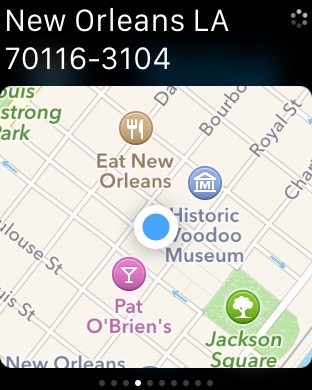
Although I'm not certain of the immediate benefit of it, I've kept the Map app in the Glances section of the Apple Watch. The shot to the left shows where we were staying at the
Bourbon Orleans Hotel in relation to our surroundings.
But the real benefit was using turn-by-turn directions on my wrist instead of having my face in my phone as we walked. I found it amazing how many people were walking around the French Quarter with their noses stuck into their phones, oblivious to their surroundings. You see this kind of practice everywhere these days, but it's dangerous on many counts, and I would suggest even more dangerous in the French Quarter.
On most days, Kathy and I would select our location ahead of time--restaurants such as
Tujagues,
The Original Pierre Maspero's,
Mother's Restaurant, to name a few we visited--and I would run the search for it on my iPhone. For what it's worth, this can be done straight from the Apple Watch with voice commands. However, I preferred to see the entire route first on the larger screen of my iPhone 6 Plus.
Once the route was started, I let the Apple Watch takeover. This allowed us to simply walk down the streets and enjoy the sites on our way. When I approached a corner where I needed to turn, the Apple Watch alerted me with the sound of a turn signal from what sounded like an older model car, and a series of taps on my wrist. By lifting my wrist, I could see directions telling me which way to turn.
My only complaint in this procedure has to do with my own impatience. After I made a turn, I wanted to know immediately which turn would be next. I don't know if the Apple Watch doesn't update that fast by design or if it's just a bit slow in this process, but it usually took getting about a quarter up the block before I could see the next direction on my wrist.
Once we arrived at our destination, the Apple Watch alerted me that we had arrived--I suppose in case we couldn't see that for ourselves.
Again, the great advantage to this is the primary benefit of the Apple Watch itself: I can be free from the drudgery of having my face in my phone all the time. Not only is this safer (no YouTube videos of me falling into a fountain, thank you), but it also allows me to enjoy the world around me while I walk.
I would not have thought of Dark Sky as a travel app, but it came in very handy on our trip. If you're not familiar with Dark Sky, it is a wonderful weather app that has the uncanny ability to tell you when it's about to start raining within a very accurate specified number of minutes. And in my experience, it's nearly always right.
The timing for our trip to New Orleans was either perfect or no-so-perfect according to how one looks at it. New Orleans can be miserably hot and muggy at certain times of the year, but during our stay this week, we experienced regular rain showers. Fortunately, these weren't the all-day rains I remember as a child growing up in Louisiana; instead, it would rain for short periods of time, followed by mostly cloudy skies. So, although we had to work around rain, it was not a constant hindrance; and we kept fairly cool most of our time there.
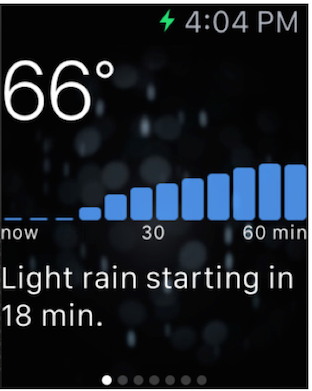 This is the only screenshot on this page not from my Apple Watch. I borrowed this one from the Dark Sky iTunes page.
This is the only screenshot on this page not from my Apple Watch. I borrowed this one from the Dark Sky iTunes page.Dark Sky came in quite handy because of this. Again, I had not thought about depending on Dark Sky while we were in New Orleans, but with the constant on again/off again rain, we were regularly kept up to date about whether we needed to be under cover or if it was safe to walk out in the open. Dark Sky would tell us that rain was beginning in
x number of minutes, so we knew how much time we had to get to our next destination. Or for Sunday morning's swim in the Bourbon Orleans' saltwater pool, we knew we had about 50 minutes before rain would temporarily spoil our fun.
Dark Sky also really helped us out on Monday afternoon when we visited St. Louis Cemetery #3 (more about that in a moment). Dark Sky told us exactly how much time we had to look for Aunt Gertrude's grave (yes, I had a real Aunt Gertrude, though I never met her). Thanks to Dark Sky, we knew we had about an hour to search for Gertrude's final resting spot before the rain hit. And Dark Sky gave me a gentle reminder on my watch when the rain was getting close. That allowed me to contact Uber, and our ride appeared right before the rain came down in buckets.
Uber
As anyone who has tried it out knows, Uber is an excellent service for those travel spots where you don't have a vehicle of your own, and it is usually less expensive than a taxi cab ride. Due to regulations in New Orleans, a taxi cab was cheaper from the airport to our hotel, but once we were checked in, Uber became our go-to service for a couple of trips we needed to make that were a bit beyond walking distance.
The Uber app on my Apple Watch allowed me to request a ride directly from my wrist, but I preferred to make the initial request from my iPhone. This allowed me to get an estimate for the fare ahead of time (the two rides we made were both around $11 each). Once I had made my request through the Uber app, though, I could let the Apple Watch take over.
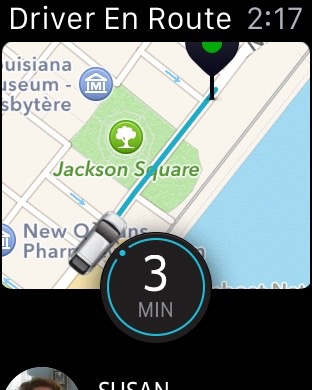
With the Apple Watch I could monitor the amount of time left before the driver reached us. This has the same advantage as using the watch for turn-by-turn directions: it keeps my face out of a phone and keeps me aware of my surroundings. The app on my watch would give me a snippet of a map displaying my location as well as an approximated time for our driver's arrival.
My great grandfather, William Porter Mansfield, had a brother, Thomas Mansfield. This great grand uncle of mine fell in love with the New Orleans culture and moved his family there in the 1930s. I know that he died in 1940 (from complications of diabetes--I have his death certificate), but I don't know for certain where he was buried. His wife, Ursula Gertrude Woodward Mansfield, died in 1962; and according to her obituary, she was buried in St. Louis Cemetery #3.
I wanted to find her grave, and ultimately I hoped to discover that old Uncle Thomas was buried with her.
I figured that once we were in New Orleans, I would check in with the office that held the cemetery records, and they could tell me where in St. Louis Cemetery Aunt Gertrude was buried. Unfortunately, I forgot that Monday was Memorial Day--our only real day to look--and the office was closed for the holiday. Kathy and I decided to go out to St. Louis Cemetery #3 anyway, even though it was the metaphorical needle in a haystack.
St. Louis Cemetery #3 is quite large. We looked around for 45 minutes to an hour and never even saw one Mansfield on a tombstone. There were, of course, lots of French names. Okay, technically, there weren’t the traditional tombstones either. New Orleans cemeteries are above ground because of the high water table. We don’t want Aunt Gertrude to float away after all.
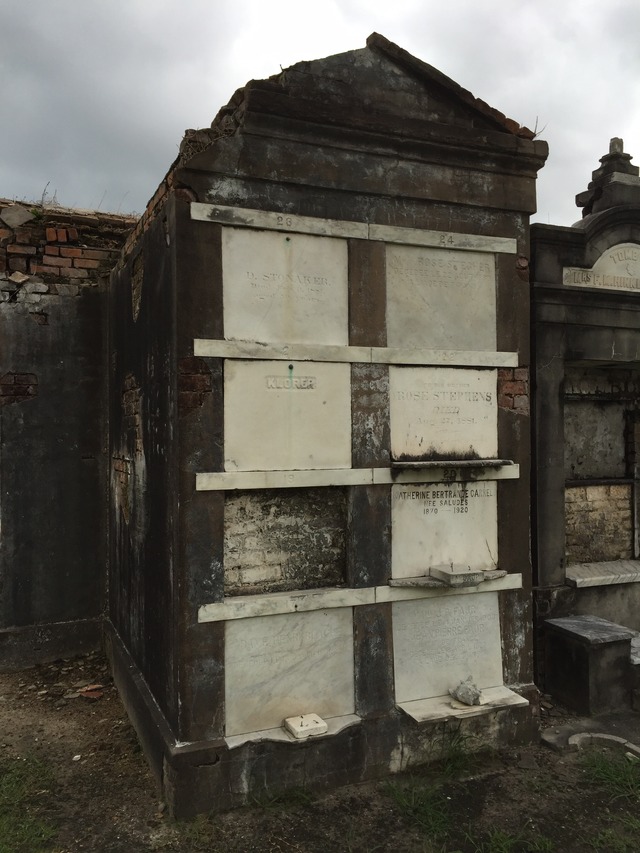 A family (not mine!) entombment at St. Louis Cemetery #3
A family (not mine!) entombment at St. Louis Cemetery #3While at the cemetery, I don’t believe I pulled my phone out of my pocket even once because of my Apple Watch. At one point, Kathy and I went in two different directions to try to cover more ground at the same time. She and I would text back and forth every now and then, but I strictly used my Apple Watch for text, dictating my messages to her through the watch.
After a while, Dark Sky warned us of impending rain, so I called our Uber ride to pick us up. The first time I tried to find an Uber car in the area, none were to be found, but I waited a couple of minutes, tried again, and one was available.
A few incidentals and final thoughts.
On Tuesday morning, after going through security at the New Orleans Airport, my Apple Watch alerted me to the fact that it had only 10% battery left. It had not been down that low since my 72 hours of use. Evidently, I did not have the charger, which only connects via a magnet, properly in place the previous night. As soon as we got to our gate, I found an empty outlet and plugged it in. In about an hour’s time, it charged to 60% which was more than good for the rest of the day. But this was a good reminder that it might be best not to depend on the watch as the sole solution for one’s boarding pass. I did have a paper copy inside my vest.
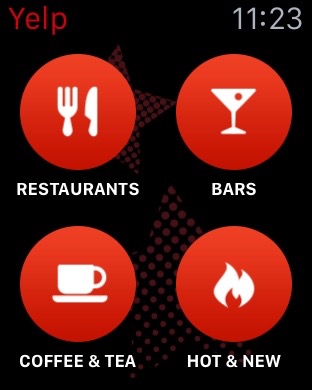
While en route to Atlanta, storms closed the airport, and our flight was temporarily rerouted to Chattanooga. By the time we finally got back to Atlanta, our flight had been cancelled, and we had to spend the night in a nearby hotel. For dinner, the
Yelp app came in quite handy. We did not use this app in New Orleans because we essentially knew what restaurants we wanted to visit while there. However, I’ve discovered that the simple interface for Yelp on the Apple Watch is fantastic. Tapping on Restaurants brings up a list of available dining establishments in proximity order from those within a certain number of feet (really) to miles. Tapping on the restaurant will bring up more details including a map, which will give you turn-by-turn directions.
When we were waiting in line to board our rescheduled flight Wednesday morning, the Delta agent began going over directions for scanning boarding passes. Paper boarding passes were obviously assumed for most travelers, but the agent also mentioned boarding passes on phones and gave instructions to hold the phone a couple of inches above the scanner as opposed to laying them down on it. No mention was made of proper procedure for the Apple Watch. I try to be nonchalant when using my Apple Watch in situations like this, but I admit my inner geek is performing cartwheels inside. As I turned over my wrist and passed my watch over the scanner, the Delta Agent said in a quieted tone, “Now that’s what I’m talking about."
I readily admit that using the watch for some of the situations described above is pretty geeky, and I simply like such things. However, it should not be missed that the Apple Watch gets my face out of my phone’s screen. Look around you in a a crowded setting. It’s nose to glass everywhere you look. This is not only dangerous; it’s also a bit…well, antisocial is stronger than I mean as it communicates intent. At the very least, so much public phone gazing is less than social. The Apple Watch, which is designed for quick glances, helps me be safe and more plugged into what’s going on around me. That’s not too bad.
Questions, thoughts, comments, rebuttals? Leave them in the comments section below!
 Wednesday, May 27, 2015 at 5:13PM
Wednesday, May 27, 2015 at 5:13PM  My Delta boarding pass.Most use of the Apple Watch is only for a few seconds. And if you lower your arm, or move it into a position not optimal for personal viewing, whatever is on the screen usually disappears. However, once I opened the QR code for my boarding pass from the Passbook, my watch stayed on, even if I changed the position of my arm. I didn't time it to know how long it stays on, and discovered it will eventually go off, but it stayed on long enough that I could set it when there were still a half dozen or so passengers ahead of me, and it stayed on long enough for me to stick my arm under Delta's scanner when it was my turn.
My Delta boarding pass.Most use of the Apple Watch is only for a few seconds. And if you lower your arm, or move it into a position not optimal for personal viewing, whatever is on the screen usually disappears. However, once I opened the QR code for my boarding pass from the Passbook, my watch stayed on, even if I changed the position of my arm. I didn't time it to know how long it stays on, and discovered it will eventually go off, but it stayed on long enough that I could set it when there were still a half dozen or so passengers ahead of me, and it stayed on long enough for me to stick my arm under Delta's scanner when it was my turn.  Although I'm not certain of the immediate benefit of it, I've kept the Map app in the Glances section of the Apple Watch. The shot to the left shows where we were staying at the Bourbon Orleans Hotel in relation to our surroundings.
Although I'm not certain of the immediate benefit of it, I've kept the Map app in the Glances section of the Apple Watch. The shot to the left shows where we were staying at the Bourbon Orleans Hotel in relation to our surroundings.  This is the only screenshot on this page not from my Apple Watch. I borrowed this one from the Dark Sky iTunes page.Dark Sky came in quite handy because of this. Again, I had not thought about depending on Dark Sky while we were in New Orleans, but with the constant on again/off again rain, we were regularly kept up to date about whether we needed to be under cover or if it was safe to walk out in the open. Dark Sky would tell us that rain was beginning in x number of minutes, so we knew how much time we had to get to our next destination. Or for Sunday morning's swim in the Bourbon Orleans' saltwater pool, we knew we had about 50 minutes before rain would temporarily spoil our fun.
This is the only screenshot on this page not from my Apple Watch. I borrowed this one from the Dark Sky iTunes page.Dark Sky came in quite handy because of this. Again, I had not thought about depending on Dark Sky while we were in New Orleans, but with the constant on again/off again rain, we were regularly kept up to date about whether we needed to be under cover or if it was safe to walk out in the open. Dark Sky would tell us that rain was beginning in x number of minutes, so we knew how much time we had to get to our next destination. Or for Sunday morning's swim in the Bourbon Orleans' saltwater pool, we knew we had about 50 minutes before rain would temporarily spoil our fun.  With the Apple Watch I could monitor the amount of time left before the driver reached us. This has the same advantage as using the watch for turn-by-turn directions: it keeps my face out of a phone and keeps me aware of my surroundings. The app on my watch would give me a snippet of a map displaying my location as well as an approximated time for our driver's arrival.
With the Apple Watch I could monitor the amount of time left before the driver reached us. This has the same advantage as using the watch for turn-by-turn directions: it keeps my face out of a phone and keeps me aware of my surroundings. The app on my watch would give me a snippet of a map displaying my location as well as an approximated time for our driver's arrival.  While en route to Atlanta, storms closed the airport, and our flight was temporarily rerouted to Chattanooga. By the time we finally got back to Atlanta, our flight had been cancelled, and we had to spend the night in a nearby hotel. For dinner, the Yelp app came in quite handy. We did not use this app in New Orleans because we essentially knew what restaurants we wanted to visit while there. However, I’ve discovered that the simple interface for Yelp on the Apple Watch is fantastic. Tapping on Restaurants brings up a list of available dining establishments in proximity order from those within a certain number of feet (really) to miles. Tapping on the restaurant will bring up more details including a map, which will give you turn-by-turn directions.
While en route to Atlanta, storms closed the airport, and our flight was temporarily rerouted to Chattanooga. By the time we finally got back to Atlanta, our flight had been cancelled, and we had to spend the night in a nearby hotel. For dinner, the Yelp app came in quite handy. We did not use this app in New Orleans because we essentially knew what restaurants we wanted to visit while there. However, I’ve discovered that the simple interface for Yelp on the Apple Watch is fantastic. Tapping on Restaurants brings up a list of available dining establishments in proximity order from those within a certain number of feet (really) to miles. Tapping on the restaurant will bring up more details including a map, which will give you turn-by-turn directions. 


